Schengen “benefits all Swiss citizens”
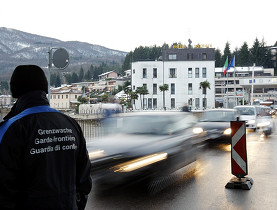
Switzerland's official entry into the Schengen zone has been described as an "important step" by Justice Minister Eveline Widmer-Schlumpf.
The Schengen agreement is set to bring closer cooperation than ever before with the European Union on police and asylum matters. This “benefits freedom in Switzerland and the safety of all our citizens”, she said on board a boat in Basel on Friday, the day of accession.
Widmer-Schlumpf joined around 100 dignitaries, including Michael Reiterer, the EU ambassador to Switzerland, on what she said could be seen as a thank-you to EU partners.
She added that Basel had been chosen as the venue because it represented a place in Switzerland that was traditionally closely associated with neighbouring countries. “But [joining Schengen] was important for all of Switzerland,” she said.
Reiterer said he was delighted to be able to experience “a historic step in Switzerland”. He pointed out that the free movement of people had nothing to do with being less safe, adding that Schengen leads to more safety.
A larger celebration, at ministerial level, is planned at the end of March when Switzerland’s airports are integrated into the Schengen accords.
European Commission President José Manuel Barroso said in a statement on Friday that Switzerland had once again proved its close cooperation with the EU.
“Schengen is a victory for unity, peace and freedom in Europe,” he said. On Monday Barroso will welcome Widmer-Schlumpf and cabinet colleagues Pascal Couchepin and Hans-Rudolf Merz to Brussels.
Barroso’s statement made no mention of possible consequences to Schengen if the Swiss public votes in February against extending the free movement of people to Romania and Bulgaria. But on Thursday Commission Vice-President Jacques Barrot said one couldn’t “lift barriers and at the same time build them elsewhere”.
Smooth operation
“Everything went smoothly,” said the head of border control at Constance, in Germany, on Friday. The head of the Schaffhausen-Thurgau border crossing also spoke of a “faultless implementation”.
German Interior Minster Wolfgang Schäuble described Switzerland’s entry to the Schengen zone as a “great success”.
“The fact that in Europe we now no longer carry out controls at internal borders is an unbelievable benefit to people’s freedom,” he said on Friday.
In short, the Schengen accords deal with the abolition of systematic passport controls among the participating countries.
But there will be no great changes at Swiss borders on the official entry into Schengen. On Friday border guards were randomly checking around three per cent of the 700,000 people who cross Swiss borders every day.
“Customs controls will remain so Switzerland’s entry into Schengen will not have the same symbolic meaning,” said Catherine Kropf at the Swiss justice and police ministry.
Since Switzerland is not a member of the EU’s customs union, there will be no changes for goods entering the country.
For example, Schengen will not change the amount of red wine that people can bring into Switzerland from France, and customs controls will remain.
Systematic controls of passports and identity cards at border crossings will be lifted but they will be replaced by random checks within border regions and in international trains.
But this is not really new territory for the Swiss either since Swiss border guards have been carrying out mobile border controls for some time.
“Extremely positive”
Schengen will bring most changes for the police, which can now use the Schengen Information System (SIS) data bank, although this was already introduced provisionally in August.
The justice and police ministry describes the first trials with the SIS as “extremely positive”. Swiss police officers and border guards were confronted with an average of 30 so-called hits in the database.
In the first 100 days of trials, they found 900 names, mainly of foreigners not permitted to enter the Schengen Area. A large majority were about stolen cars or false bank notes.
Experts from Schengen states said earlier this year that data protection in Switzerland was adequate but warned that it should be strengthened and become more independent.
On Friday Switzerland also became a member of the EU’s Dublin accord on asylum.
This is designed to clarify the country responsible for asylum seekers. As a general rule, someone seeking asylum is required to apply in the member state first entered. Such a system has advantages for a land-locked country like Switzerland because it is surrounded by other Dublin accord members.
swissinfo
The following rights apply to the Schengen Information System:
Information: If a person suspects he is registered in the SIS, he can demand access to the information.
Correction: If incorrect or improper data has been entered into the system, an individual can demand a correction or deletion of the entry.
Appeal: If information or a correction is refused, an individual can make an appeal or demand a check by the data protection authorities.
Compensation: A person has the right to compensation if he or she suffers a loss as a result of information registered or used in contradiction to the rules concerning handling of information in the SIS.
As a member of the Schengen Area, Switzerland has to take on EU laws applicable to Schengen and Dublin. Bern negotiated one exception – references to banking secrecy.
Since the signing of the Schengen treaty in 2004, the EU has officially passed on 71 new laws to Switzerland on the issue.
A referendum has only been initiated against one issue – the introduction of passports with fingerprints. It will go to a nationwide vote in Switzerland on May 17.
Another change is likely to be controversial: Switzerland will have to shorten the maximum length of detention pending deportation from 24 months to 18.

In compliance with the JTI standards
More: SWI swissinfo.ch certified by the Journalism Trust Initiative
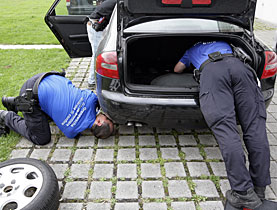
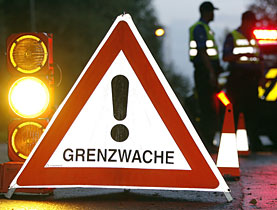
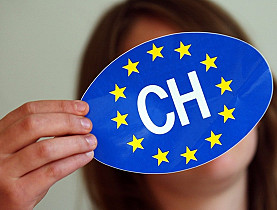
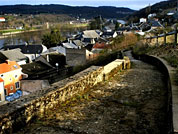
You can find an overview of ongoing debates with our journalists here. Please join us!
If you want to start a conversation about a topic raised in this article or want to report factual errors, email us at english@swissinfo.ch.